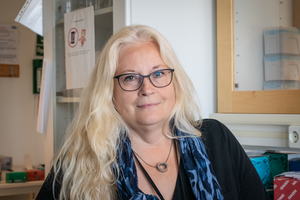Image: Marie Larsson, Professor of Virology at Linköping University.
outlook more
Photo credit: Magnus Jansson/Linköping University
The immune cells of patients treated in hospital for COVID-19 at the beginning of the pandemic were still affected six months later. A study conducted by researchers at Linköping University suggests that infection with the SARS-CoV-2 virus has significant effects long after the patient is symptom-free. The results were published in Frontiers in Immunology.
“We see that severe COVID-19 infection has long-lasting negative effects on the immune system. Obviously, when people are hospitalized with COVID, the immune system is quite severely compromised, but we didn’t expect the effects to persist 7-8 months later,” says Francis Hopkins, a postdoctoral researcher in the Department of Biomedicine and Clinical Sciences at the University of Linkoping.
Several types of cells are important when the immune system starts fighting the SARS-CoV-2 virus. Some white blood cells, B cells, make antibodies that recognize and attach to specific parts of the virus, while several types of T cells help kill infected cells. In the current study, researchers from Linköping University examined whether a severe COVID-19 infection has long-term effects on the body’s defense cells.
They studied 46 patients with COVID-19 who had been treated at Vrinnevi Hospital in Norrköping and 31 healthy controls. Researchers analyzed blood samples taken from patients upon admission to the hospital and 2 weeks, 6 weeks and 6-8 months later. They not only looked at the properties of the virus-specific T cells, but also examined whether the disease had a general effect on all T cells.
“The effects on immune system T cells are interesting and mixed. Some of them remain activated long after the onset of the disease, while others are “tired” and unable to function normally. We see similar effects in patients with chronic HIV infection. The question is: Why are these effects still present after such a long time?” asks Marie Larsson, Professor of Virology in the Department of Biomedical and Clinical Sciences at Linköping University and leader of the study.
In the early stages of the pandemic, scientists at the LiU helped develop tests that the healthcare system could use to analyze patient samples. At this early stage, it was not known whether different people’s immune systems differed in their ability to produce antibodies against the virus. If so, would this affect the severity of the disease? What the current study showed was that all patients developed antibodies to the virus within 2-3 weeks of the first onset of symptoms, which has also been shown in several previous studies.
“We see that all patients in the study developed antibodies against SARS-CoV-2. The levels of these antibodies started to fall after six months,” says Melissa Govender, a postdoc in the group.
The study was funded by SciLifeLab/KAW COVID-19 and the Swedish Research Council with ALF funding from Region Östergötland and Linköping University.
The item: T cell abnormalities persist for at least 6 months after hospitalization for COVID-19, Melissa Govender, Francis Hopkins, Robin Göransson, Cecilia Svanberg, Esaki Shankar, Maria Hjorth, Åsa Nilsdotter-Augustinsson, Johanna Sjöwall, Sofia Nyström and Marie Larsson, (2022), Frontiers in Immunologypublished online August 8, 2022, DOI:10.3389/fimmu.2022.931039
For more information contact:
Marie Larsson, Professor, [email protected], +46 13 282987
Karin Söderlund Leifler, Spokesperson, [email protected], +46 13 28 13 95
diary
Frontiers in Immunology
research method
Experimental study
subject of research
persons
article title
T-cell abnormalities persist for at least 6 months after hospitalization for COVID-19
Article publication date
August 8, 2022
COI statement
The authors state that the research was conducted without commercial or financial relationships that could be construed as a potential conflict of interest.
Disclaimer: AAAS and EurekAlert! are not responsible for the accuracy of the press releases published on EurekAlert! by contributing institutions or for the use of information about the EurekAlert system.
#Severe #COVID19 #affects #immune #system #months


Leave a Comment